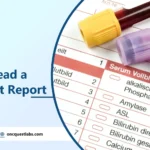A Total Immunoglobulin E (IgE) test is a blood test that measures the total amount of immunoglobulin E antibodies in your bloodstream. Immunoglobulin E is a type of antibody produced by the immune system in response to allergens, which are substances that trigger allergic reactions. IgE antibodies play a central role in allergic responses, including allergies to pollen, dust mites, pet dander, certain foods, and other environmental triggers.
The Total IgE test is used to:
Diagnose Allergies: It helps identify if a person has a heightened immune response to specific allergens.
Monitor Allergic Conditions: Doctors may use this test to track changes in IgE levels over time in individuals with known allergies.
Assess Sensitivity: The test can help determine the overall sensitivity of a person’s immune system to potential allergens.
Evaluate Asthma: Elevated IgE levels can be associated with asthma, and the test may aid in evaluating asthma severity.
Rule Out Other Conditions: In some cases, elevated IgE levels might suggest an underlying immune disorder.
The Total IgE test measures the overall amount of IgE antibodies in the blood, but it does not identify specific allergens. For that purpose, specific IgE tests (also known as allergy skin tests or allergen-specific IgE tests) are conducted to pinpoint the allergens triggering a person’s allergic reactions.
It’s important to note that elevated IgE levels alone do not definitively diagnose allergies, as some other factors can also contribute to elevated levels. A doctor will consider the results of the Total IgE test along with other clinical information to make an accurate diagnosis and develop a suitable treatment plan if allergies are confirmed. If you suspect you have allergies or need more information about the Total IgE test, it’s best to consult a healthcare professional.
Why IgE Test is Done:
The IgE test, specifically the Total Immunoglobulin E (IgE) test, is conducted to assess the overall level of IgE antibodies in the blood. It is primarily performed for the following purposes:
Diagnosing Allergies: The IgE test can help determine if an individual has an elevated immune response to allergens such as pollen, dust mites, pet dander, certain foods, and other environmental triggers.
Evaluating Allergic Conditions: Doctors may order the IgE test to evaluate the severity of allergic conditions and monitor changes in IgE levels over time.
Assessing Asthma: Elevated IgE levels can be associated with asthma, and the test may aid in assessing asthma severity.
Guiding Allergy Management: The results of the IgE test, along with other clinical information, can guide healthcare providers in identifying potential triggers and developing a suitable treatment plan.
What IgE Test Result Means:
The results of the Total IgE test are reported in international units per milliliter (IU/mL) of blood. The interpretation of the results depends on the context and the individual’s clinical presentation:
Normal Range: In individuals without allergies or other underlying conditions, IgE levels are typically within a normal range. However, there is variability in what is considered “normal” depending on the specific laboratory and testing method.
Elevated Levels: Elevated IgE levels suggest a heightened immune response to allergens. This could indicate allergies, asthma, or other allergic conditions.
Highly Elevated Levels: In some cases, very high IgE levels might suggest an underlying immune disorder, such as hyper-IgE syndrome.
It’s important to note that the IgE test alone does not identify specific allergens causing the immune response. For specific allergen identification, healthcare providers often order allergen-specific IgE tests (also known as allergy skin tests or specific IgE blood tests).
How the Total Immunoglobulin E Test is Performed:
The IgE blood test is a simple and routine procedure:
Blood Sample: A healthcare professional will draw a blood sample from a vein, usually from the arm.
Sample Processing: The blood sample is sent to a laboratory, where it is analyzed to measure the level of IgE antibodies.
Test Results: The results are reported as the concentration of IgE in international units per milliliter (IU/mL) of blood.
Interpretation: The results are interpreted by a healthcare provider in the context of the individual’s medical history, symptoms, and other relevant factors.
If you suspect allergies or have concerns about your immune response, consult a healthcare professional. They can recommend appropriate testing and provide guidance based on your specific situation.
Total Immunoglobulin E (IgE) Test Result and Normal Range:
The normal range for total IgE levels can vary depending on the laboratory and the testing method used. Generally, the reference range for total IgE in adults is typically between 0 and 100 international units per milliliter (IU/mL) of blood. However, it’s important to note that “normal” ranges can vary between different laboratories and may be influenced by factors such as age, sex, and underlying health conditions.
Interpreting Total IgE Test Results:
Normal Range: Total IgE levels within the normal range suggest that the individual’s immune response to allergens is not significantly elevated.
Elevated Levels: Elevated total IgE levels may indicate a heightened immune response to allergens, potentially suggesting allergies, asthma, or other allergic conditions.
Highly Elevated Levels: In some cases, very high levels of total IgE might be indicative of an underlying immune disorder, such as hyper-IgE syndrome. Further evaluation and testing would be necessary in such cases.
Frequently Asked Questions (FAQs) about Total Immunoglobulin E (IgE) Test:
Q: What is IgE?
A: IgE (Immunoglobulin E) is a type of antibody produced by the immune system in response to allergens. It plays a central role in allergic reactions.
Q: Why is the Total IgE test done?
A: The Total IgE test measures the overall level of IgE antibodies in the blood and is done to diagnose allergies, evaluate allergic conditions, and assess asthma severity.
Q: How is the Total IgE test performed?
A: A blood sample is drawn from a vein, usually in the arm. The sample is then sent to a laboratory for analysis.
Q: Can the Total IgE test identify specific allergens?
A: No, the Total IgE test measures the overall level of IgE antibodies but does not identify specific allergens. Allergen-specific IgE tests are used for that purpose.
Q: Is the Total IgE test painful?
A: Drawing blood for the test may cause mild discomfort, but it is generally well-tolerated.
Q: How do I prepare for the Total IgE test?
A: In most cases, no specific preparation is needed. However, it’s a good idea to follow any instructions provided by your healthcare provider.
Q: Can I have the Total IgE test if I’m taking medications?
A: Some medications can affect test results, so inform your healthcare provider about any medications or supplements you are taking.
Q: What if my Total IgE levels are elevated?
A: Elevated levels may suggest allergies or other conditions. Your healthcare provider will interpret the results in the context of your medical history and symptoms.
Remember, the interpretation of test results should always be done by a qualified healthcare professional who considers your individual health situation. If you have concerns about allergies or IgE levels, consult your healthcare provider.





